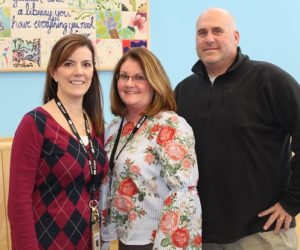Submitted by Reina R. Rago, Communications Coordinator, Marlborough Public Schools
Part 1 of 2

(Photo/submitted)
Marlborough – One in five students today may struggle with mental illness as reported in the December 2017/January 2018 issue of Educational Leadership. Furthermore, The National Alliance on Mental Illness (NAMOI) estimates that 20 percent of youths aged 13-18 live with a mental health condition. On average, there are 121 suicides every day in the United States, of all ages as reported by the American Foundation for Suicide Prevention. According to NAMOI, 50 percent of all mental illness begins by age 14. Sadly, mental health challenges are common among students today. For example, adverse childhood experiences leading to trauma, General Anxiety Disorder, depression, opioid abuse, non-suicidal self-injury and depression plague our students, regardless of their race or economic background. As educators, it is not enough to focus on academics. Understanding and supporting students’ mental health is vital in educating the Whole Child.
In order to address mental health conditions, “schools must foster emotional safety for students and teachers alike,” states Nadja N. Reilly in her article “The Bonds of Social-Emotional Learning” (Educational Leadership, Dec. 2017/Jan. 2018). “The traditional family unit is often fractured and the demands on students can be significant,” stresses Sharon Buckley, Supervisor of Counseling for the Marlborough Public Schools. Educators need to know why their students are struggling if they want their students to truly learn and be successful.
The No Child Left Behind Act (NCLB) established in 2001 adopted a narrow focus on standardized test results in two core academic subjects, reading and mathematics, ignoring the total development of children. However, the aim of education must go beyond academics and prepare students to tackle societal issues and be aware of global problems. Students need to learn what it means to exhibit sound character, develop a social conscience, and to think critically. This is what it means to educate the whole child. Although educating the whole child is a contemporary phrase, its philosophical tenets are not. In his 1818 Report of the commissioners for the University of Virginia, Thomas Jefferson asserted that public schools were established for academic instruction as well as for moral and social reasons. In other words, schools must serve both individuals and the larger society.
Marlborough Public Schools (MPS) strongly supports the three “R” pillars of education: Rigor, Relevance, and Relationships. Dr. Willard (Bill) Daggett, the founder of International Center for Leadership in Education (ICLE), asserts that these elements provide the hallmark for education today and are integrally connected. “If one is missing in our teaching practices, we are not doing our best to prepare students for success in school and in life,” he states. Daggett’s philosophy of education proposes that when students find their studies relevant, teachers can increase the rigor to meet the needs of students, and relevance makes rigor possible. Dr. James P. Comer, professor of Child Psychiatry, Yale University puts it well: “No significant learning occurs without a significant relationship.” The power of that one strong adult relationship is a key ingredient in resilience — a positive, adaptive response in the face of significant adversity — according to a new report from the National Scientific Council on the Developing Child, a multidisciplinary collaboration chaired by Harvard’s Jack Shonkoff.
Educating the Whole Child means going beyond teaching fundamental skills. “To close the achievement gap and to ensure that every student succeeds, Marlborough Public Schools is committed to the total development of children,” Superintendent Maureen Greulich stated. “We believe that all students can learn.”











